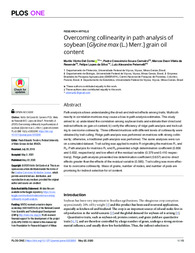Overcoming collinearity in path analysis of soybean [Glycine max (L.) Merr.] grain oil content.
Overcoming collinearity in path analysis of soybean [Glycine max (L.) Merr.] grain oil content.
Autoria: DEL CONTE, M. V.; CARNEIRO, P. C. S.; RESENDE, M. D. V. de; SILVA, F. L. da; PETERNELLI, L. A.
Resumo: Path analysis allows understanding the direct and indirect effects among traits. Multicollinearity in correlation matrices may cause a bias in path analysis estimates. This study aimed to: a) understand the correlation among soybean traits and estimate their direct and indirect effects on gain oil content; b) verify the efficiency of ridge path analysis and trait culling to overcome colinearity. Three different matrices with different levels of collinearity were obtained by trait culling. Ridge path analysis was performed on matrices with strong collinearity; otherwise, a traditional path analysis was performed. The same analyses were run on a simulated dataset. Trait culling was applied to matrix R originating the matrices R1 and R2. Path analysis for matrices R1 and R2 presented a high determination coefficient (0.856 and 0.832, respectively) and low effect of the residual variable (0.379 and 0.410 respectively). Ridge path analysis presented low determination coefficient (0.657) and no direct effects greater than the effects of the residual variable (0.585). Trait culling was more effective to overcome collinearity. Mass of grains, number of nodes, and number of pods are promising for indirect selection for oil content.
Ano de publicação: 2020
Tipo de publicação: Artigo de periódico
Unidade: Embrapa Café
Palavras-chave: Coefficient, Components, Maturity, Melhoramento Genético Vegetal, Multicollinearity, Seed protein, Software, Soja, Yield
Observações
1 - Por padrão são exibidas publicações dos últimos 20 anos. Para encontrar publicações mais antigas, configure o filtro ano de publicação, colocando o ano a partir do qual você deseja encontrar publicações. O filtro está na coluna da esquerda na busca acima.
2 - Para ler algumas publicações da Embrapa (apenas as que estão em formato ePub), é necessário ter, no celular ou computador, um desses softwares gratuitos. Sistemas Android: Google Play Livros; IOS: iBooks; Windows e Linux: software Calibre.
Acesse outras publicações
Acesse a Base de Dados da Pesquisa Agropecuária (BDPA) para consultar o acervo completo das bibliotecas da Embrapa.

